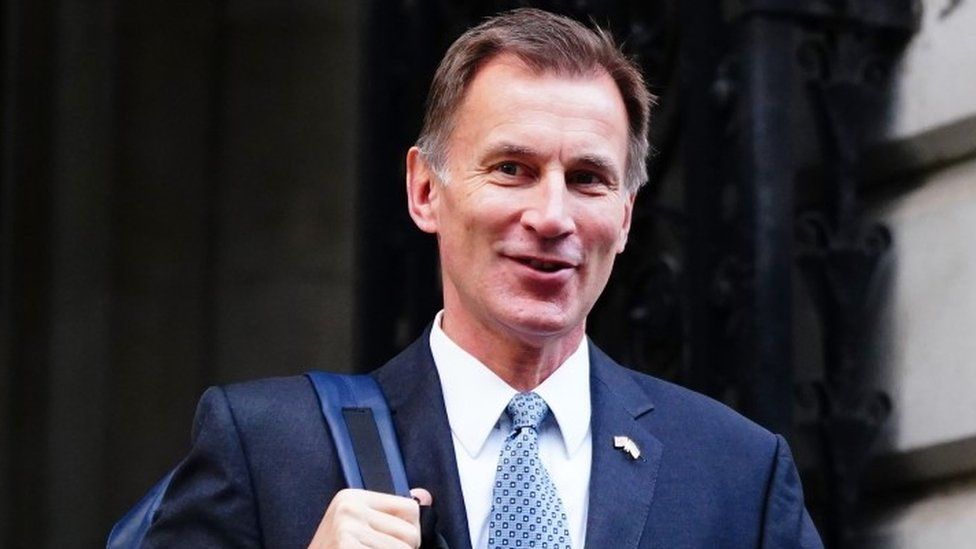
The total amount that workers can accumulate in their pension savings before paying extra tax is expected to be increased in Wednesday's Budget.
The final figure has not been confirmed, but people are expected to be able to save up to £1.8m over a lifetime, up from £1.07m currently.
The policy aims at stop people from reducing their hours or retiring early due to the tax charges.
Persuading workers to work for longer is part of UK plans to boost growth.
The chancellor could also increase the £40,000 annual cap on tax-free contributions to pensions, to £60,000.
It is expected millions could benefit from the rise, including those who have worked in the public sector for many years. There has been a particular focus on doctors and consultants - some of whom have retired early or reduced hours for pension tax reasons as the NHS has become increasingly stretched.
UK economic growth has flatlined in recent months and the Bank of England expects the UK to enter a recession this year. One of the main issues raised has been whether enough people who can work, are working.
Many industries have struggled to recruit workers, though job vacancies are falling. Earlier this year, Mr Hunt pledged to consider changes to encourage the over-50s who had taken early retirement during or after Covid to return to work, saying he "would look at the conditions necessary to make work worth your while".
Not everyone believes that boosting allowances is the best policy to meet these ends for the wider working population.
"Increasing them will reduce the damage they do, but even better would be a more thorough reform of how pensions are taxed," said Carl Emmerson, from the Institute for Fiscal Studies, a leading independent think tank.
"High earners with big pension pots do benefit from inappropriately generous tax treatment of pensions, but there are much better ways of restricting this than these crude limits."
What are pension allowances?
The so-called lifetime allowance is the total amount of money you can build up in a workplace defined benefit pension scheme and savings in a defined contribution pension before you face a further tax charge. The tax is levied on the excess over the allowance. The state pension is not included in the calculation.
The charge comes at certain times, such as when you start to draw a defined benefit pension. The allowance had been scheduled to remain at £1.07m until 2025-26.
It has been seen as a particular issue in the medical profession, leading to some doctors and consultants reducing their hours or retiring early from the NHS because they were in danger of breaching the allowance. They calculated that continuing to work was counterproductive for their finances.
The British Medical Association (BMA) has called the current lifetime allowance "punitive" and argued it had encouraged doctors to leave the profession.
The annual allowance is the amount you can build up each year, before facing a tax charge, and has been subject to much of the same debate.

Types of pension explained
A defined contribution pension is when you build up a pot of pension savings which is invested. On retirement, you have various options.
One of those is to buy an annuity with all, or part, of that pot. Another option is to "drawdown" some of that pension while leaving the rest invested, known as flexible access.
A defined benefit pension is a bit different. It sees the amount you receive in retirement depend on how long you have been in the scheme and your salary during that time.

A third change could also be made, again to encourage people to get back to work.
Under current rules, somebody who has already accessed their private pension after the age of 55 can subsequently only put £4,000 a year into their pension pot a year before facing an additional tax change. This is known as the money purchase annual allowance.
Again, the suggestion is that this is a disincentive to return to work, and the allowance could rise to its original level of £10,000.
Pensions providers have welcomed the expected change in the rules.
Dean Butler, at Standard Life, said: "The lifetime allowance has become unfit for purpose in recent years and has increasingly caught middle earners who have saved diligently over the years."
Any increase in the annual allowance, he said, would be of specific help to those with irregular earnings who were relying on making larger pension contributions later in their careers.
Tom Selby, head of retirement policy at AJ Bell, said: "The constant salami slicing of pensions allowances we have seen in recent years have not only reduced retirement savings incentives for Brits directly - they have also created unwieldy complexity which makes explaining the benefits of pension saving unnecessarily difficult."
Anyone drawing their pension is still liable to income tax as normal.
Debate over working numbers
The number of people not working has a broader effect.
A smaller workforce means less tax to pay for services like the NHS, and greater spending on benefits.
Since people on benefits generally have less money to spend than those in work, it also means less spending on the High Street.
That in turn is bad for businesses and how many people they want to employ.
In turn, that can affect how many jobs are available for those who are job hunting.
Related Topics
https://news.google.com/rss/articles/CBMiLGh0dHBzOi8vd3d3LmJiYy5jby51ay9uZXdzL2J1c2luZXNzLTY0OTQ5MDgz0gEwaHR0cHM6Ly93d3cuYmJjLmNvLnVrL25ld3MvYnVzaW5lc3MtNjQ5NDkwODMuYW1w?oc=5
2023-03-14 10:07:53Z
1833450985
Tidak ada komentar:
Posting Komentar